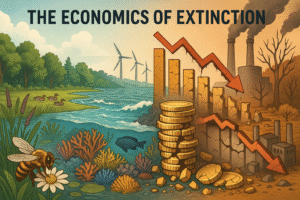Did you know that loneliness is associated with a 29% higher risk of heart disease and significantly increased healthcare expenses globally?
Loneliness, often perceived as an emotional or social issue, has profound economic implications that many overlook. It’s more than just a feeling; it’s a hidden cost to society that affects productivity, healthcare systems, and even consumer behaviour. Let’s explore how the “Economics of Loneliness” impacts our lives and the broader economy.
The True Cost of Loneliness
Healthcare Burden
Loneliness doesn’t just hurt emotionally; it physically affects the body. Studies have shown that chronic loneliness can lead to health problems such as depression, anxiety, cardiovascular disease, and even dementia. The economic impact of treating these conditions is staggering.
Case Study: The UK introduced a “Minister for Loneliness” in 2018 to address the estimated £2.5 billion annual cost of social isolation on its healthcare system.
India’s Perspective: In India, urbanization and nuclear families are reducing traditional support networks. Rising mental health issues are pushing healthcare systems to adapt, with costs surging as therapy and medications become necessities.

Workplace Productivity
Lonely employees are less engaged, which directly affects productivity. According to Gallup, a disengaged employee costs companies 34% of their salary annually in lost productivity.
Example: Imagine an IT company like Infosys (an Indian multinational corporation providing IT consulting and services) losing millions due to underperforming employees battling loneliness. Employers are beginning to invest in team-building activities and wellness programs to counteract this trend.
Consumer Behavior
Loneliness influences how people spend money. Lonely individuals often turn to retail therapy, buying products or services that provide a fleeting sense of connection or happiness.
Real-Life Trend: The rise of pet adoption during the COVID-19 pandemic is a prime example. Companies like Mars Petcare (which sells pet food and services globally) benefited as people sought companionship through pets.
Loneliness in Urban India
India is witnessing a shift as traditional joint families give way to nuclear setups. Urban areas, with their fast-paced lifestyles, have become hotspots for loneliness. Startups like YourDOST (an online mental wellness platform) are emerging to fill the gap, offering virtual counselling for people struggling to connect.
Anecdote: Take Rajesh, a 32-year-old software developer in Bengaluru. Despite earning a six-figure salary, he felt isolated. He turned to YourDOST for counselling, which helped him navigate his mental health challenges while managing his finances better.
Government and Corporate Interventions
Global Examples
Countries like Japan have implemented “social robots” in elderly care homes to address loneliness among older adults. The United States has campaigns promoting mental health awareness in workplaces.
India’s Initiatives
While India lacks structured policies, steps like mental health inclusion in insurance plans are promising. Local governments are also exploring programs to improve public spaces and foster community interactions.
Technology: A Double-Edged Sword
While apps like WhatsApp and Instagram connect us digitally, they often replace face-to-face interactions. Overuse of social media has been linked to increased feelings of isolation.
Future Solutions: Emerging technologies like virtual reality (VR) could provide more immersive social experiences. Companies like Meta (formerly Facebook) are investing in such platforms, hoping to reduce digital loneliness.
Conclusion: A Collective Responsibility
Loneliness isn’t just an individual’s problem; it’s a societal and economic challenge that requires collective action. Governments, corporations, and individuals must work together to create more connected communities, support mental health initiatives, and foster meaningful relationships.
Call to Action: Let’s start small—reach out to someone you know who might feel lonely. A simple gesture can ripple out, making a significant difference.
Author’s Note
The topic of loneliness is close to my heart because it touches everyone, directly or indirectly. Writing this blog made me realize the invisible threads connecting emotions and economics. I hope it encourages readers to value human connection.
G.C., Ecosociosphere contributor.
References and Further Reading
- World Health Organization: Mental Health
- UK Loneliness Strategy
- How loneliness affects older adults- Sisters Hospitallers CIO. https://www.sistershospitallers.org/how-loneliness-affects-older-adults/
- Sustainability for a Better Tomorrow & better mental health: quotes from Elon Musk -https://www.bluntreflections.com/post/sustainability-for-a-better-tomorrow-better-mental-health-quote-from-elon-musk. https://www.bluntreflections.com/post/sustainability-for-a-better-tomorrow-better-mental-health-quote-from-elon-musk





Comments
Really fantastic information can be found on weblog.